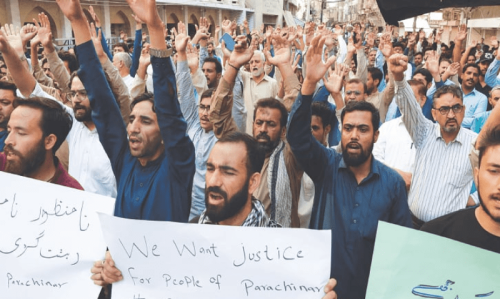WARREN Christopher’s death removes from the scene one of America’s finest diplomats who had a deep understanding of the intricacies of South Asia’s problems and who played a crucial role in some of the major events involving Pakistan during the Clinton administration. Until Bill Clinton chose Christopher as his secretary of state in January 1993, South Asian affairs were looked after by the assistant secretary of state for the Middle East. It was Christopher who separated South Asia from the Middle East desk and appointed Robin Raphel as assistant secretary for South Asia. Robin Raphel was the widow of American ambassador Arnold Raphel killed in the air crash along with Ziaul Haq in 1988.
Two problems dominated the US-Pakistan relations as Clinton moved into the White House — F-16s and Pakistan’s name on the ‘watch list’ of terrorism. So long as the anti-Soviet, US-led ‘jihad’ was going on in Afghanistan, presidents Ronald Reagan and George Bush senior continued to issue the annual certificate required under the Pressler amendment for America’s economic and military aid to continue to a Pakistan suspected of having a secret nuclear weapons programme.
However, after the Soviets pulled out, Bush senior refused to issue the annual certificate. Consequently, Islamabad was getting neither the F-16s nor the money it had paid for 28 of the 60 fighter aircraft. Then, driven by motives still unclear more than eight years after his execution, Aimal Kansi, a Pakistani, shot two CIA officials dead outside the agency’s headquarters in Langley on Jan 25, 1993.
Christopher was known to be unhappy with the stalemate in relations with Pakistan and wanted its name removed from the ‘watch list’. Kansi’s crime added to Islamabad’s problems, for Pakistan stood in danger of being declared a terrorist state.
In 1993, Benazir Bhutto, then in the opposition, came to America. Whether or not the former prime minister met Clinton and Christopher was never confirmed, but she had a series of meetings with congressional leaders and State Department officials and pleaded Pakistan’s case effectively.
Christopher, despite opposition from certain quarters in the State Department and the White House, succeeded in making Clinton realise that placing Pakistan on the list was unfair and that this was depriving America of whatever influence it had with Islamabad. On July 14, 1993, Pakistan’s name was removed from the list, as State Department spokesman Mike McCurry announced that the secretary of state had made “a determination” that Islamabad had taken a number of steps that had satisfied America that Pakistan’s attitude was “much more cooperative”.
A most extraordinary indication of Christopher’s feeling for Pakistan came in 1994 when he proposed that there should be a one-time exception for the Pressler amendment certificate, and Islamabad should get the fighter planes it had paid for.
Senator Larry Pressler took this as a personal offence and, briefing only Indian journalists based in Washington, said he would work to have the exemption cancelled. He wrote in a letter to Clinton that he had heard from many sources, including Christopher and deputy defence secretary Frank Wisner, that there was going to be a one-time exception for the amendment and begged the president to give him a few minutes on his morning jog so he could plead his case.
During the subsequent hearings in Congress, Clinton administration officials, including deputy secretary of state Strobe Talbott and undersecretary for international security Lynn Davis, justified the one-time exception, saying this was in America’s interest. Ultimately, it was Pressler who won, for the strong India caucus in Congress sabotaged the deal and, instead of the planes, Pakistan got its money — $658m — back in various forms through the Brown amendment in 1996.
Christopher had the nerve to maintain his cool, no matter what crisis. Those days, Senator Jesse Helms, head of the Senate Foreign Relations Committee, was the scourge of administration officials. A confirmed Zionist, and pro-Indian to the core, Helms one day went after Christopher’s skin on an issue other than Pakistan. It was about Jean-Bernard Aristide (recently back in Haiti), and Helms went on the offensive, claiming American foreign policy was like “the streets and highways” of Washington. Christopher came under attack from both Republicans and Democrats, especially because he had abstained himself from several hearings. Given the fact he had to travel a lot, Christopher said he had been on Capitol Hill 31 times.
Helms then asked him when he was there the last time. When Christopher couldn’t come up with the exact date, Helms embarrassed him by recalling the date. Then Helms said in an emotional voice: “I challenge anybody to demonstrate that restoring Aristide to power in Haiti is worth one American life.” When Christopher replied that Aristide had been elected, Helms shot back, “so was Hitler” and asked him about the CIA’s role in Haiti.
Christopher replied that he could not discuss security matters in public, but when Helms continued to be obnoxious, Christopher told Helms that as secretary of state he served the American people and Congress and added, “Senator, I’m not going to talk about intelligence briefings that I may have received. I’ve indicated to you that I’ll be glad to discuss that with you in private. Senator, I’ve lived quite a while, and a few people have sometimes misunderstood my courtesy for a lack of resolve. But I think they’ve been sorry when they’ve made that mistake.”
The writer is a member of staff.












































Dear visitor, the comments section is undergoing an overhaul and will return soon.